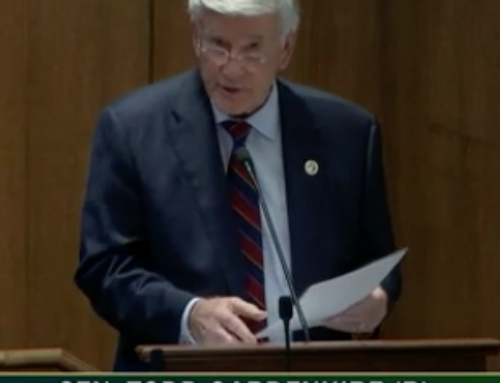OxyContin maker Purdue withdraws effort to close parts of state’s lawsuit
OxyContin maker Purdue Pharma has withdrawn its motion for a protective order to conceal parts of the state of Tennessee’s lawsuit against it that contains allegations and evidence of unlawful conduct.
The state’s attorney general filed its 274-page lawsuit under temporary seal, but argued the seal should be lifted within 10 days. Purdue then filed a motion for a protective order to seal parts of the lawsuit, claiming specific information in it were trade secrets that could harm its competitive position if revealed.
TCOG was permitted to intervene in the case, along with Knoxville News Sentinel Editor Jack McElroy, to oppose efforts to keep the information confidential. Our position was represented by attorney Rick Hollow of Knoxville, who argued that the overwhelming public interest in the opioid crisis outweighed any speculative assumption that any information in the suit is worthy of protection. See our filing with the court.
The state of Tennessee also argued against keeping any part of the lawsuit confidential. “If granted, a protective order would hide specific examples of Defendant’s unlawful conduct, its scale and statewide impact, Defendant’s knowledge of its unlawful acts, and Defendant’s financial gain from the prescriptions written by specific prescribers whose practices showed indications of abuse or diversion of OxyContin from the public…”
“Common sense suggests the public has a substantial interest in the specific pieces of information that Defendant seeks to redact, which concern all or parts of 418 separate paragraphs of the State’s Complaint.”
Read the AG’s filing with the court arguing for openness.
Some things that Purdue initially sought to redact are outlined by the AG. This provides us now with a guide to what exactly they wanted to keep from the public’s eyes:
- The text of call notes that document conversations sales representatives had with prescribers (300 paragraphs)
- The text of reports from Purdue’s abuse and diversion detection program that concern prescribers (43 paragraphs)
- The frequency of Purdue visits to individual prescribers who were flagged or should have been flagged by Purdue’s abuse and diversion detection program. (20 paragraphs)
- The percentage of Purdue’s sales that stem from new patients as compared to existing patients (2 paragraphs)
- The number of prescriptions and tablets prescribed by individual Tennessee prescribers on an annual basis and revenue Purdue acquired from these Tennessee sales (22 paragraphs)
- The number, percentage, and dollar figures from Purdue’s savings card redemptions from individual Tennessee prescribers (4 paragraphs)
- Research about how the savings card program impacts sales (5 paragraphs)
- The number of sales representatives Purdue employed in Tennessee and the total number of sales visits they made statewide on an annual basis (6 paragraphs)
- Internal research on what factors impact prescription rates (1 paragraph)
- Details of Purdue’s marketing and training materials (26 paragraphs).





